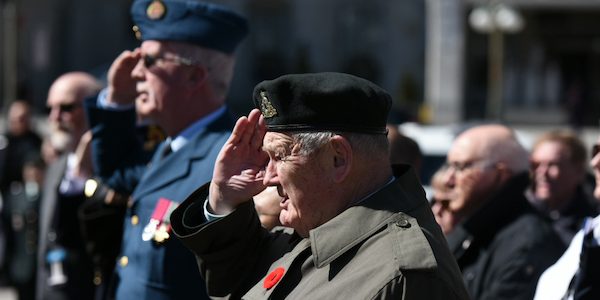During the lead up to Canada’s 150th birthday celebration, it would be fair to say that national patriotism certainly reached remarkable heights. With patriotism at such a level, it’s important to remember the Canadian military veterans who fought, sacrificed and gave their lives to shaping the country we live in.
Today (July 5), Sherry Romanado, the Parliamentary Secretary to the Minister of Veterans Affairs and Associate Minister of National Defence, traveled to the Military Family Resource Centre (MFRC) in Greenwood, Nova Scotia. Here, Romanado met with Canadian Armed Forces members and their families to provide details on how the 2017 Federal Budget would impact military families in Canada.
“Our Government understands how much of themselves families and caregivers invest in the transition and recovery of Canada’s Veterans,” reads a prepared statement by Romanado. “They deserve nothing less than the full support of the Government of Canada as they help their loved ones make a successful transition to post-military life. There is no better place to demonstrate that support than at an MFRC.”
In a media release, Veterans Affairs Canada explained that the military veterans aspect of the 2017 Federal Budget is a “comprehensive package” designed to “recognize the important role of caregivers, help more families, support mental health and pay for the education and training Veterans need to find the work they want in their post-military lives.”
-Adam Grant
Here are some of the budget highlights:
- Expanding the Veteran Family Program across all 32 Military Family Resource Centres (MFRCs). The expansion of the program would result in medically-released Veterans and their families having continued and uninterrupted access to all 32 MFRCs across the country, in addition to the other resources that were part of the initial pilot.
- Enhancing and simplifying support to Veterans’ families and caregivers by replacing the Family Caregiver Relief Benefit with a $1,000 monthly, tax-free benefit paid directly to a Veteran’s caregiver.
- $133.9 million over six years to create a new Veterans’ Education and Training Benefit. This new benefit will provide Veterans with the funding for college, university or a technical education of their choice. Veterans with six years of service may be eligible for up to $40,000 and Veterans with at least 12 years of service may be eligible for up to $80,000to cover tuition, course materials, and some incidentals and living expenses.
- Redesigning the Career Transition Services (CTS) program which would include an expansion of current eligibilities; the removal of time limits for Veterans, reservists and survivors to access benefits; and simplification or elimination of the application process for participants.
- $4 million over four years to establish a Veteran Emergency Fund to enable Veterans Affairs Canada to address unique and urgent veteran-specific situations.
- $13.9 million over four years to establish a Veteran and Family Well-Being Fund. This fund would be used for the development of new and innovative ways to support Veterans and their families by providing financial support to organizations to conduct research and implement initiatives and projects. These organizations can be non-profit, voluntary and in some cases, for-profit as well.
- Plans to create a new Centre of Excellence in Veterans’ care, specializing in mental health, post-traumatic stress disorder and related issues for Veterans.
Recently, theZoomer aired an episode in which a panel of experts discussed what life is like for those who take on the role of caretaker. You can watch that episode right here:
Also, be sure to watch theZoomer’s poignant Canada 150 special:





